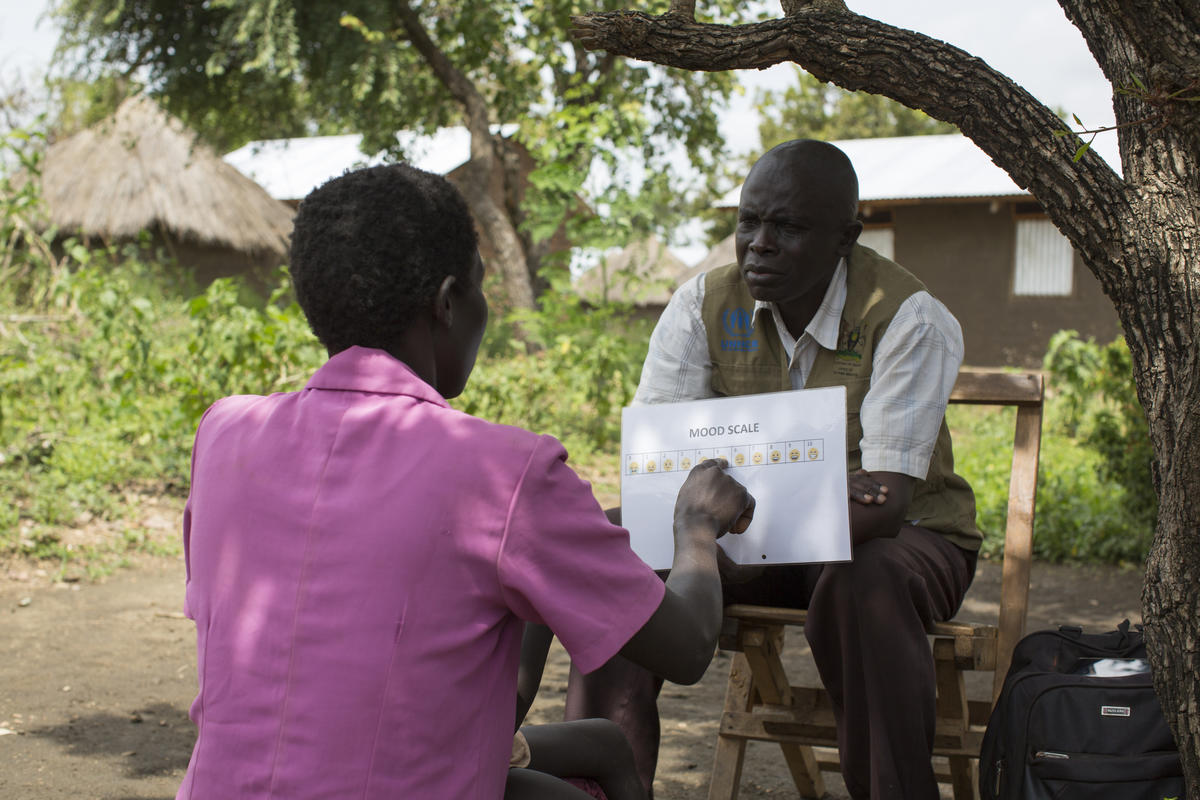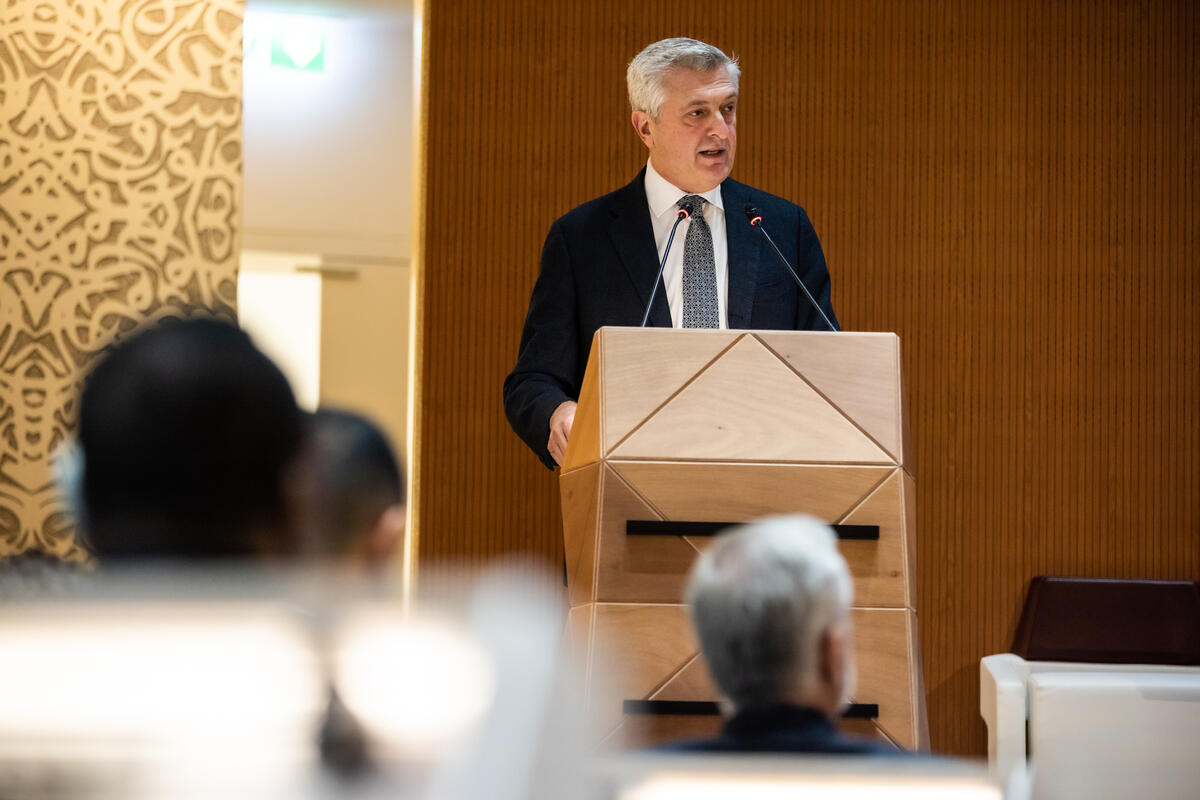UNHCR must work closely with Iraqis, says Lubbers at ExCom opening
UNHCR must work closely with Iraqis, says Lubbers at ExCom opening

GENEVA, Sept 29 (UNHCR) - UN refugee agency chief Ruud Lubbers today opened the annual meeting of its governing body by affirming UNHCR's commitment to Iraq and pledging to work closely with local authorities to help hundreds of thousands of displaced Iraqis return home eventually.
Addressing the 54th session of the 64-member Executive Committee (ExCom) in Geneva Monday, Lubbers stressed that UNHCR "cannot operate from a fortress" despite the August 19 attack on the UN headquarters in Baghdad that killed 22 people and put on hold UNHCR's plans to repatriate some 500,000 Iraqi refugees and 800,000 internally displaced people.
"Our strength lies in our ability to communicate with the people who need us, to work through local authorities, and to build up local capacities," said the High Commissioner. "If we cannot work with the Iraqi people and with Iraqi authorities, then we cannot work there at all."
He pledged to build confidence in UNHCR among the people of Iraq, help strengthen the capacities of Iraqi authorities, and work closely with the new Iraqi Minister for Displacement and Migration, Mohammed J. Khudhir, who was attending the ExCom meeting.
Outlining UNHCR's operations around the world, Lubbers applauded the "truly exceptional" repatriation of more than 2 million people to Afghanistan last year and the encouraging returns to Angola, calling it "an opportunity to put an end to yet another of Africa's biggest and most protracted crises of displacement."
However, he emphasised, these positive developments must be sustained by continued donor and government support for rehabilitation, reconstruction and reintegration.
Elsewhere in Africa, the High Commissioner welcomed the "marked improvement" in Liberia and the "positive momentum towards peace" in southern Sudan, but expressed concern over the ongoing fighting in north-western Sudan that has driven some 65,000 people into neighbouring Chad.
Also worrying was the plight of North Koreans who had left their country "illegally" for China, where UNHCR has been denied access to them for years.
"An analysis of currently available information recently carried out by our Department of International Protection concludes that many North Koreans may well be considered refugees," said Lubbers. "In view of their protection needs, the group is of concern to UNHCR. For those in need of assistance, UNHCR is ready to work with partners in meeting their needs. Above all, the principle of non-refoulement must be respected."
At the same time, the High Commissioner announced plans to find durable solutions for over 100,000 Bhutanese people in Nepal's camps. UNHCR will promote self-reliance projects for those who wish to settle in Nepal, support resettlement for vulnerable cases, and insist on the right of return for those who wish to go back on their own. The refugee agency will not promote repatriation because it has been denied access to Bhutan and cannot monitor the return process.
In Europe, Lubbers also proposed a two-pronged approach to help Chechens under pressure to leave Ingushetia. The displaced Chechens must continue to be guaranteed a viable safe haven in Ingushetia until they decide that conditions are conducive for them to return home. For those who wish to return, UNHCR will start projects in Chechnya to enable sustainable reintegration.
On the asylum debate among the European Union countries, Lubbers welcomed new thinking on how to enhance refugee protection in regions of protection. But he warned that "the highly politicised environment in which much of the asylum debate has taken place has prompted increasingly restrictive measures in many areas of asylum law and practice," and urged governments of EU countries not to lose sight of their aim to turn Europe into a common "asylum space".
He also appealed to ExCom members for $56 million in contributions towards the 2003 Annual Budget, and presented the 2004 Annual Budget for approval, explaining that the proposed sum of $995 million was significantly higher than in recent years because many of the activities that had been funded through Supplementary Budgets are being absorbed into next year's Annual Budget.

He added, "Ultimately, this is not just about funding; it is about adopting an entirely new approach to the whole concept of partnership. It is about putting refugees first, and institutional needs second."
The High Commissioner said considerable progress had been made in his "Convention Plus" initiative aimed at finding durable solutions for refugees through special, multilateral agreements. He also updated the committee on his "UNHCR 2004" process, which is aimed at reviewing how the refugee agency is best situated within the UN system vis-à-vis States and partners.
Responding to Lubbers' commitment to work towards a united and predictable UN approach towards crises, ExCom guest speaker Jan Egeland, Under-Secretary General for Humanitarian Affairs and Emergency Relief Coordinator, said, "We need faster operational deployment and improved funding for IDP [internally displaced persons] crises. UNHCR's commitment to contribute to a more predictable response by the UN system to these crises is therefore timely."









